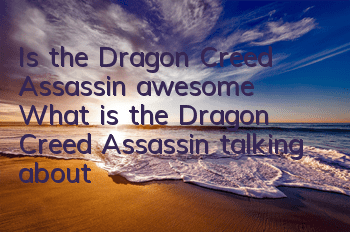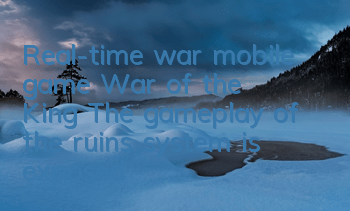"Open World ARPG based on a Western fantasy background produced by Japanese manufacturers" - When we mention this series of labels, the one that comes to mind is undoubtedly "Elden Far Ring".
But before that, this almost specifically refers to "The Creed of Dragons" produced by Capcom.
At the days when everyone was waiting for the release of "Eldon Far Ring" before, "Dragon Creed" was once called "top meal replacement"
The Creed of Dragons happened to be released ten years ago, and today, many people still miss the experience it brings-
In the game, a mercenary NPC is trying his best to attract the attention of a monster. The damage he caused to the enemy can only be described as "scraping". Everything is just to cover the mage character controlled by the player behind him.
The mage is hiding in the dark not far away singing "Meteor Fire Rain". Once the player releases the casting button or the character suffers too many attacks, all the casting bars accumulated before will be wasted.
The 8 seconds in the game have never been as long as it is now, but Morning Star is gathering around the mage, and he gradually drifts away from the ground and floats into the air.
Finally, the player released the casting key that was vibrating more and more intensely. The mage on the screen danced the staff wrapped around the flames. The meteor tracks on the skyline gradually became clear, and three meteorites fell from the sky and smashed towards the enemy one after another. Accompanied by heavy roar and flying dust, the enemy's half-screen blood strips also turned into three sections and disappeared, and the broken body fell to the ground...
This is just an ordinary encounter in "Dragon Creed", but it is enough to be described by players at that time as "the first time I experienced the casting feel of a mage character in the game."
Everyone fantasized that ARPGs in the future can inherit such epic battle scenes, but ten years later, such a gaming experience seems to be the only one.
1
For the global gaming industry, 2012 when "Dragon Creed" was born was at a very delicate time. At this time, players generally believe that Japanese gaming industry is already declining, gradually lagging behind European and American manufacturers in terms of technical strength and creativity. The future of the gaming industry belongs to the open world 3A created by the latter.
This anxiety is passed on to the developer level, and works like "Dragon Creed" that fully imitate European and American games were born.
As the "Open World ARPG", "Dragon Creed", initially targeted "The Elder Scrolls 4 Annihilation" and "The Fables of Gods and Ghosts 2", Capcom spent nearly three years producing it, determined to create a "million-level sales volume"”'s brand new IP.
However, just one year before the game was released, "The Elder Scrolls 5: Skyrim" was the first to be released, bringing the "Open World" game category to a new level.
The total area of the entire map of "Dragon's Creed" that appeared later is less than 1/4 of that of Skyrim Province. It is difficult to compare with "The Elder Scrolls 5" in terms of content richness and game completion. From the production level, the "Dragon Creed" that is neither high nor low is hard to say is a successful challenge.
You can feel from the map that "Dragon's Creed" is quite "barren" in terms of content
Fortunately, although "Dragon Creed" is covered with a layer of Western fantasy shell, it is still a Japanese game in its bones. As a result, Sai Weng lost his horse and did not really stand on the same track as those fantasy open-world games produced by European and American manufacturers. This can be seen from the game's script.
The main story of "Dragon's Creed" is simple and cliché, but it is just that "the protagonist, who was taken away by the evil dragon, embarked on the road to slay the dragon and save the world." Along the way, he will encounter some very pediatric political dramas. It is not until the end of the game is approaching that players will know the truth of this world: slaying dragons is just a training game, a selection of the next guardian of the world.
In this long selection, some people died tragically under the dragon's claw; some people chose to sacrifice their love for glory and wealth; some people returned to an ordinary and comfortable life; some people turned into dragons and came to the world to find the next challenger...
Players can personally experience each of the above endings through different choices in the game, making the game plot form a closed loop of reincarnation.
The birth of the Red Dragon is the starting point of the game, but it is also one of the endings of the players
"The dragon slayer eventually becomes an evil dragon" was a counter-routine story mode at that time. There were many ending branches in this type of game, and the shock it brought to players was self-evident.
In 2020, Netflix produced an animation adapted from the same name of "Dragon's Creed", but simply attributed the human contradiction in the story to the dispute between good and evil, and the result was naturally a wave of bad reviews. Compared with the Western fantasy adventure that opens and closes, the original "Dragon Creed" always has an Eastern restraint in content expression.
The animation restores many classic scenes and skill performances in the game, but the story completely loses the charm of the original work
But this kind of restraint may not be all good things. "Dragon Creed" gives players many rights to choose freely. Many task chains related to important plots are set as branches that can be done or not, and even players need to take the initiative to search, which is easy to miss. The result is that players are likely to meet some important characters in the end-of-credit animation, but never meet them during the game.
The most difficult part of the heroine is the NTR Lord’s wife
On the other hand, although the game has arranged several important characters for the heroine to be the heroine's alternative, players can build a good impression with anyone through dialogue or transactions during the game, so that some players who have not done the heroine branch mission find that when facing the test of the Red Dragon, they find that the person who has the deepest bond with them is the weapon store owner.
Capcom's unfamiliar design experience in the open world actually brought many disaster-level gaming experiences to this game.
2
For Western RPGs, "countrymen entering the city" is often an important part of the game - players with mission have gone through the experience of a novice village, left the barren and dilapidated countryside to the rich and lively capital, and embarked on a journey to meet the king. The game has thus entered the "main dish" stage.
The Dragon Creed is not unfamiliar with this, but the production team seems to have completely failed to understand the meaning of this scene. The result is perhaps the most embarrassing "entering the city" experience in the history of the game - the reason why players go to the capital is to report their deeds of killing monsters to the lord, and to this end, a ox cart pulling the monster's corpse sets off from the town, walks through the canyon and through the tunnel, and repels the goblins and harps, and they also have to add blood to the old cow who is rushing on the road from time to time...
Players can kick the cow and make it accelerate for a short period of time in this process, but if they kick it over, it will slow down or even stop, which will not be worth the effort
Under normal process, this boring escort mission takes at least 15 minutes to complete, and the player has to try any unnecessary operations, which makes the journey longer. This ox cart later became a nightmare for players of "Dragon Creed" Speed Pass - when they tried their best to compress the game process that usually takes 40 hours to pass the level into less than 15 minutes, this ox cart journey still took up a full 5 minutes.
As can be imagined, when the players escorted their teeth to the capital, any excitement and expectation had long been wiped out. They just wanted to rush into the castle to find the lord who issued the mission, and pulled his collar and beat him up.
"The smelly old man is so bad at first glance"
The plot rhythm of the game not only did not become more compact at this time, but instead let the players "measure the world with their feet" without hesitation, traveling back and forth to every corner of the vast map to complete some painless main tasks.
Another bad fault of "Dragon Creed" has to be mentioned at this time.
"Dragon's Creed" has a rich prop synthesis system, and there are various resources on the roadside for collection. It is not difficult for us to feel the power of the production team.The picture shows the Western RPG charm of "the props in your backpack can solve all the difficulties in front of you"; but on the other hand, any action of the character in the game will consume his pitiful physical strength slot, and once it is exhausted, it will not be able to move in place.
The weight of the item carried by the character will significantly affect the consumption and recovery efficiency of the physical trough.
So if you don't want your character to stop and breathe after two or three steps, then throwing all the props in your backpack into the warehouse and lightly putting it on is always the best choice.
The Legend of Zelda Breath of the Wild Years later proves to some extent that the "physical trough" system and the "open world" are not inherently incompatible, but for the "Dragon Creed", which is still in the exploration stage, it also stepped on almost all the design traps that the "open world" may bring - the "fake and empty" wild map, the monster camp that only obsessive-compulsive disorder patients can enjoy...
Even the current criticized "formal open world", the overall gaming experience is enough to beat "Dragon's Creed".
3
As mentioned at the beginning of the article, the combat system of "Dragon Creed" is unique, and even for Capcom, who is called "Action Heavenly Lord" by players, it still seems quite special.
After all, from Devil May Cry to Monster Hunter, Capcom's action game brands are mostly focused on developing their own game styles, and few try to integrate their strengths into another completely unfamiliar game type like "Dragon Creed".
And such a collision did spark.
"Dragon Creed" inherits the common "warfare hunting" profession system in Western RPGs, including first-level warriors, mages, rangers, convertible fighters, wizards, sharpshooters, as well as mixed professional magic knights, magic archers and assassins. It is not difficult to imagine the characteristics of these professions and the responsibilities they assume in battle based on their names alone.
But "Dragon Creed" has a more complex interactive system to reflect the characteristics of these professions.
The chanting time required by the wizard in the game to cast an ultimate spell like "Meteor Fire Rain" is almost the same as the three advanced fireballs in a row, but the damage caused is very different. Therefore, if the weak mage players want to deal damage in battle, they have to hide and "hold up a big one". However, as long as they can seize the opportunity to throw out a giant snake-like tornado, they can roll all the enemies they can reach into the sky and stir into meat paste. The affliction of chanting the spell before was also wiped out.
The hurricane full of screen is not a boss's skill, but a spell cast by the player
When two characters in the team cast the same advanced spell, both sides can also achieve "resonance" and greatly shorten the chanting time. Although you can only team up with AI minions in the game, as long as the skills are matched appropriately, it will not be difficult for players to use advanced spells to clean up the battlefield with NPCs, and they can quite appreciate the sense of accomplishment of "squad combat".
The ultimate magic of the spell profession will mostly exhaust the physical slot, so that the characters can only rest on the spot, but at this time, even if the enemy is not directly destroyed, most of them will be hit hard, which is enough to give the whole team a chance to breathe
The ultimate skill of the magic archer, "Stand Up Magic Gun", is another kind of "team collaboration". This move will turn a teammate's life into a magic arrow in exchange for high damage and bullet time. The magic arrow left the string, and the teammates around him and enemies from afar fell down together. The evil fun brought by this is also difficult to find in other action games.
The melee profession in "Dragon's Creed" also inherits Capcom's rich and smooth action modules, and can also climb to large enemies to attack weaknesses. Compared with other Western ARPGs, it can be regarded as a first-class action performance, but compared with the outstanding performance of the spell profession, it can only be said to be pale in comparison.
Capcom himself obviously also knows the pros and cons of "Dragon Creed".
Nearly a year after the game was released, "Dragon Creed" launched an enhanced version of "Dragon Creed: Dark Awakener", which contains the new content "Black Curse Island" - a dungeon dominated by combat content, where players can swipe equipment and skill points, better configure their teams, and challenge more difficult enemies. This method has a bit of the meaning of "the chef made a table of innovative dishes, and saw that the diners were embarrassed and finally he was dissatisfied with frying a specialty dish", but it was indeed recognized by players.
Conclusion
According to the sales data released by Capcom, the initial edition of "Dragon Creed" sold 1.3 million copies, while the launch of "Dragon Creed: Dark Awakener" sold 2.1 million copies; in 2017, "Dragon Awakener" was transplanted to a new generation console platform and sold another 1 million copies, which does not include the sales after it was re-transplanted to NS in 2019.
Obviously, "Dragon Creed" has already achieved its goal of "selling millions" back then. As a "cold rice" that has been frequently stir-fried, but it has not aroused people's disgust, players have always been very enthusiastic about the sequel.
Capcom has always been ambiguous about this, and the news of the sequel is limited to rumors, while the online version of "Dragon Creed OL" has long been discontinued.
After all, "The Creed of Dragon" is a work born in a special period. Behind it is the imagination and exploration of the "open world" by game makers ten years ago. At that time, everyone did not have a clear methodology for making an "open world" game, and anyone could try to hand over their own answers. And compared to the annoying part of the game, players are more willing to appreciate the highlights of the game.
But time has changed, and when the development concept of the European and American game industries for the "open world" is facing a bottleneck, Japanese game manufacturers have gradually regained their own rhythm and can develop works that highlight their own characteristics. The "open world" has also changed from a hot commodity in the past to a "hot potato". It can no longer be used to make an unnecessary side mission for players to buy it by making an empty big map.
Tear off the similar labels on the surface. "Eldon Far Ring" is obviously not the "New Era Power Enhanced Version" of "Dragon Creed", but players always have the same expectations for the game - that is the experience of "One Family".









